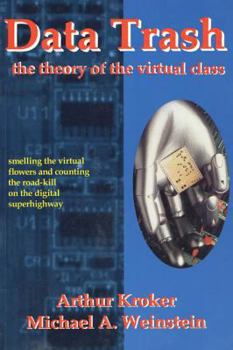Data Trash: The Theory of Virtual Class
Select Format
Select Condition 
Book Overview
Smelling the virtual flowers and counting the road-kill on the digital superhighway are just a couple of things that Kroker and Weinstein explain. Others include: the theory of the virtual class; virtual ideology; the will to virtuality; the political economy of virtual reality; prime time reports; virtual (photographic) culture; and the virtual history file.
Format:Paperback
Language:English
ISBN:031212211X
ISBN13:9780312122119
Release Date:September 1994
Publisher:St. Martin's Griffin
Length:160 Pages
Weight:0.60 lbs.
Dimensions:0.5" x 6.0" x 9.0"
Customer Reviews
1 rating
THE document on the rise of virtual culture
Published by Thriftbooks.com User , 20 years ago
I don't have time this instant to go into the depth that this book deserves, as I just was going by and saw the not-so-hot reviews. I be remised if I did not pipe in. This is one of the finest books I have read (No, I am not holding it next to Heideggar, for depth, per se, or Dostoevsky for wit, though it has both in droves). That said, I have read it about 10 times. I don't know why I stuck with it, I think it was because of all the web stuff that was enveloping the world in the late 90s (as cliché as that may sound). If you do stick with it you will be rewarded with an interesting and with, most likely, one of the only genuine discussions of the connections between virtual reality, monetary value (World Bank, IMF, though I am not sure they are named directly), advertising, the Image (in the Boorstein sense) reality television (years ahead of its times) and the creep of reverse nihilism, nihilism turned on the self. If you aren't into the philosophical aspects, it also makes a great sci-fi read.





